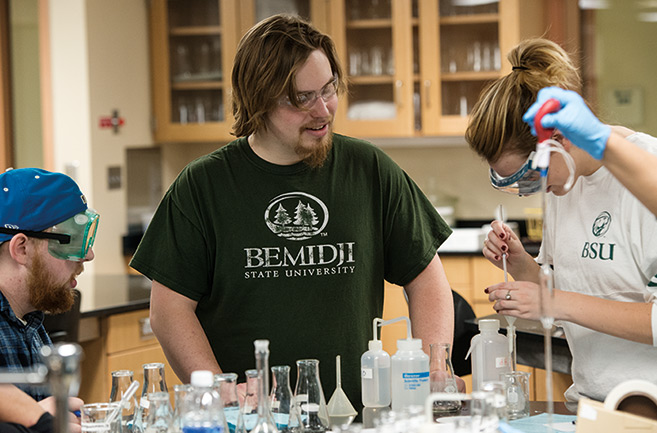
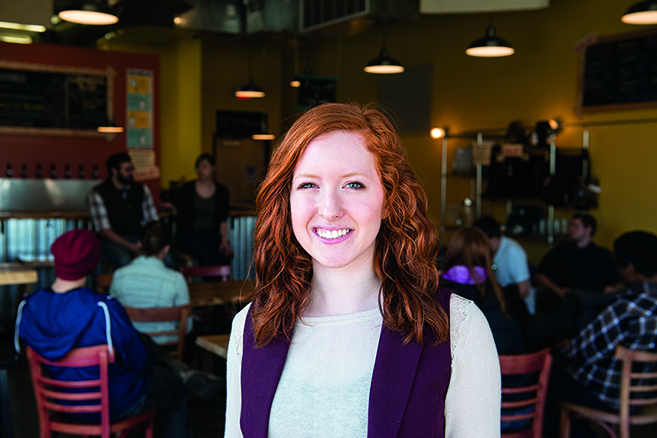
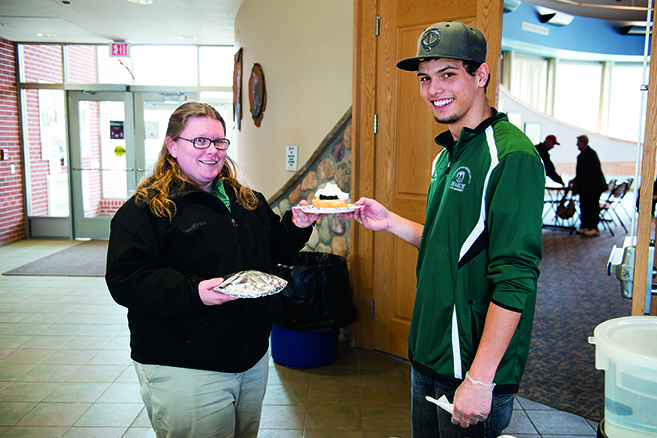
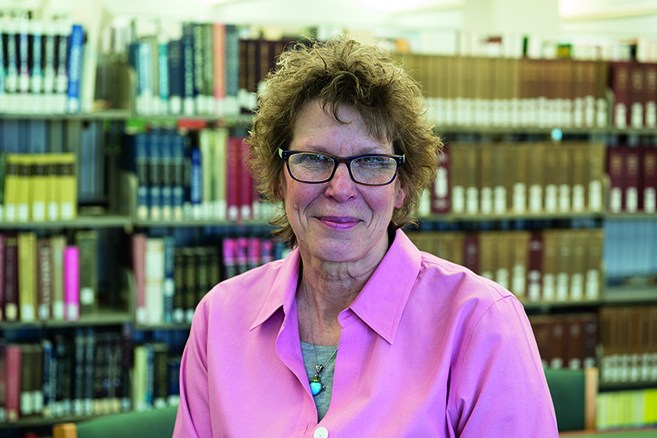
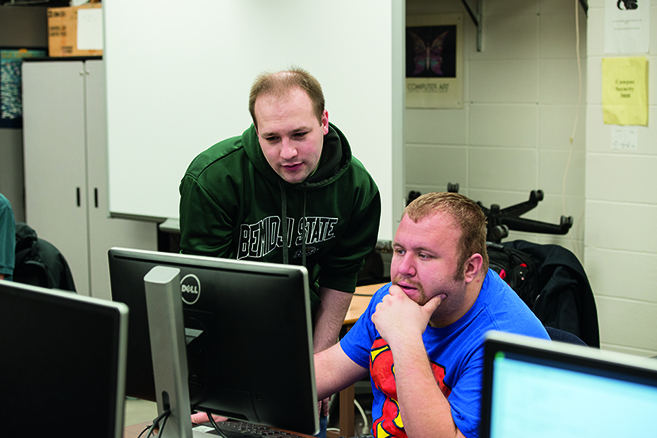
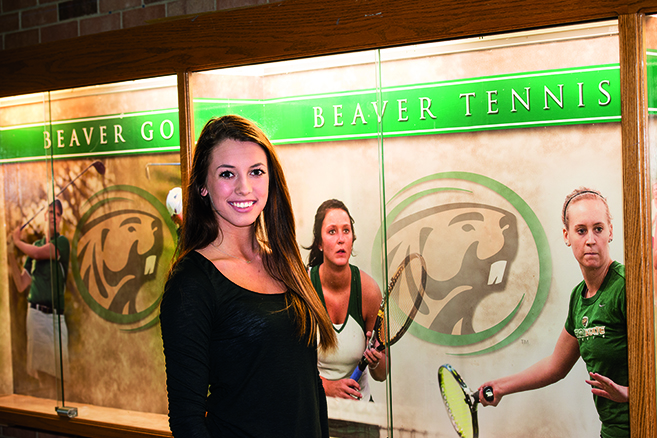
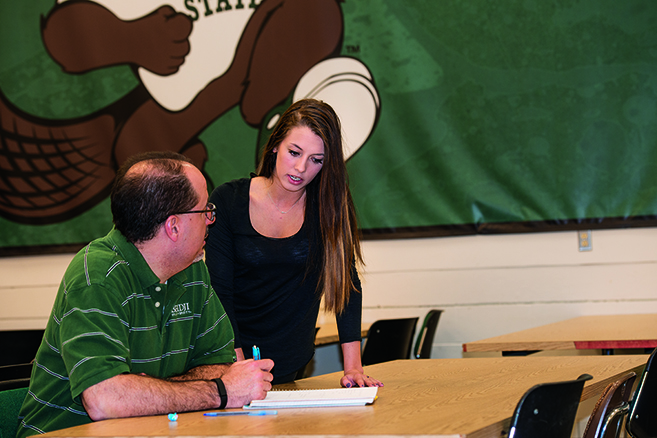
By Scott Faust
Among the thousand students at North Branch Area High School, Josh Hatton wasn’t one to stay after school for extracurricular activities.
His parents worked and couldn’t bring him home if he missed the regular bus. But a bigger obstacle was his own lack of interest.
Things hadn’t changed by the time Hatton started at Bemidji State University in 2012: “If you saw me as a freshman, I would be one of the quiet ones who didn’t ask a question,” he said.
Three years later, Hatton is president of the student Chemistry Club, a second-year student senator, a teaching assistant for two chemistry lab courses and a budding researcher. This summer he will work on a laser spectrascopy research project at the University of Minnesota Twin Cities.
Now when he’s in class, Hatton said, “I’m willing to ask a question because I know if I’m confused, other people probably may not be understanding it, either.”
He is far from alone at Bemidji State in his transformation from self-containment to selflessness. In fact, his journey is remarkably similar to that of many other BSU students who’ve learned lessons and discovered strengths that will serve them all their lives.
Conversations with a cross-section of emerging student leaders reveal a common pathway that includes participation in academic clubs, opportunities to work directly with faculty and staff, and an ability to juggle such competing demands as jobs, intercollegiate athletics and undergraduate research. Scholarship support has been crucial for them as well.
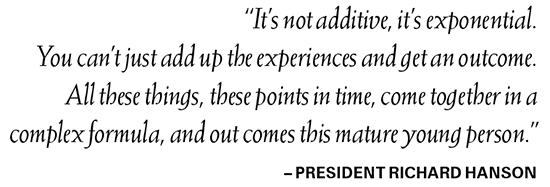 President Richard Hanson says an unseen algorithm is at work, particularly when it comes to developing leaders out of students who may not have set the world on fire in high school.
President Richard Hanson says an unseen algorithm is at work, particularly when it comes to developing leaders out of students who may not have set the world on fire in high school.
“It’s not additive, it’s exponential,” Hanson said. “You can’t just add up the experiences and get an outcome. All these things, these points in time, come together in a complex formula, and out comes this mature young person.”
Nurturing leadership, in all its many forms, is so important at Bemidji State that the university next fall will launch its first academic program focused specifically on that goal. By combining existing electives in multiple majors with new courses to synthesize and apply a deeper understanding of leadership, students will be able to earn a minor or certificate in leadership.
“We are determined to give them as many tools of leadership as we can,” Hanson said, “and equally important, the opportunity to practice them.”
Students whom faculty identify as exemplary leaders frequently are able to look back and point to a pivotal moment when they first stepped up and spoke out – when Hanson’s algorithm began to work its calculus in their lives.
Amanda Wick, a 2015 Honors Program graduate from St. Cloud, glimpsed her own possibilities as she sat in a Business Club meeting, envying the ease with which the club president kept things moving.
“I thought it would be cool to do something like that, but in the back of my head, I said I could never do something like that,” recalled Wick, who majored in business administration with a double minor in psychology and information systems management.
 This year Wick became the Business Club president. In addition to joining with others to organize speakers and field trips, she enlisted fellow students in a holiday “Giving Tree” project on campus to collect essentials for children and families served by the Boys & Girls Club of the Bemidji Area. She also participated in BSU’s Eurospring program in England and was a student assistant for accounting chair Dr. Sandra Kranz.
This year Wick became the Business Club president. In addition to joining with others to organize speakers and field trips, she enlisted fellow students in a holiday “Giving Tree” project on campus to collect essentials for children and families served by the Boys & Girls Club of the Bemidji Area. She also participated in BSU’s Eurospring program in England and was a student assistant for accounting chair Dr. Sandra Kranz.
“I grew more comfortable, and I decided to get out of my comfort zone,” Wick said. “I think it’s just taking that step and realizing you may succeed or fail, but either way you’re going to get some experience from it.”
Like Hatton, senior Tom Sullivan was hardly a joiner at Ogilvie High School, although he did captain in basketball and football. The latter took him to Central Lakes Community College in Brainerd, where he earned an associate degree before coming to BSU in 2013.
Sullivan is an enrolled member of the White Earth Band of Ojibwe, but native culture was not prominent in his upbringing. Seeking a way to plug into campus as a transfer student, he joined BSU’s Council of Indian Students last year and soon found himself treasurer of an organization working to finance the annual student pow wow.
This year the incoming CIS president had her hands full with leading two campus clubs, and she took Sullivan up on his suggestion that they serve as co-presidents. He said he has been challenged, but also motivated, by his new role.
“I just went out and got involved in more stuff,” Sullivan said, “and with that came more responsibility. I stuck with it instead of not doing it.”
Having switched his major from political science to Indian studies, he serves as a peer adviser at BSU’s American Indian Resource Center and is taking a lead in cultural activities such as a dream-catcher workshop. He helped build and enter an AIRC float in last fall’s Homecoming Parade and even ran unsuccessfully for Homecoming king.
“I grew up, I guess,” Sullivan said.
Maturity is not the issue for non-traditional student Vicky Filer, but lifelong personal growth very much is.
At age 56, after a lengthy career as a food and beverge director for hotels, Filer is using money left her by a beloved aunt to pursue a bachelor’s degree in sociology, with a minor in psychology. She hopes to continue on and earn a doctorate, possibly working in academia or for a nonprofit or government agency.
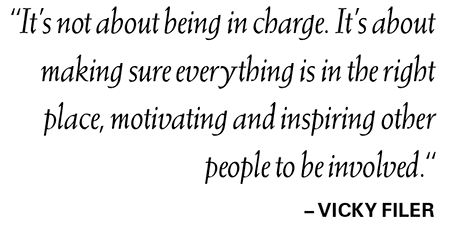 Filer is a teaching assistant for the sociology department chair, Dr. Deb Peterson, who this winter invited her to organize a campus blood drive sponsored by the Sociology Club. The experience helped Filer distinguish between managing paid staff and leading volunteers.
Filer is a teaching assistant for the sociology department chair, Dr. Deb Peterson, who this winter invited her to organize a campus blood drive sponsored by the Sociology Club. The experience helped Filer distinguish between managing paid staff and leading volunteers.
“It’s about making a difference,” she said. “It’s not about being in charge. It’s about making sure everything is in the right place, motivating and inspiring other people to be involved. It’s about outcomes, not control. What’s important is that we get people to donate blood.”
One lesson Filer drew on from her experience moving up the ladder in hospitality was “you can’t be afraid to ask for help.”
“It’s rewarding when someone asks you to share your knowledge,” she said. “You gained it for a reason, not just to keep it in your head.”
While all of these students recognize a connection between their leadership involvement and a future career, that link is especially immediate for 2015 graduate Ben Goltz of Bagley. He is married to a fellow BSU student who gave birth to their first child in October.
Goltz, who briefly attended BSU in 2008 but dropped out, will take his computer science degree directly into a web-developer position with Digi-Key Electronics in Thief River Falls. He eventually hopes to benefit from the company’s financial support for post-graduate study.
His experiences at BSU made him a much more confident job candidate. Those include serving as vice president of the student Computer Science Club, working as a teaching associate in a computer science lab, and being invited to present his own research in artificial neural networks last August at a scholarly conference at the University of California, Berkeley.
He largely credits Dr. Marty Wolf, a professor in the Department of Mathematics and Computer Science, who – among other things – seized on his idea to use a small, affordable computer called a Raspberry Pi to teach assembly-language programming.
Goltz said Wolf has mentored him on how to share his growing expertise with peers.
“He’s helped me identify the ‘when’ and the ‘how,’” Goltz said. “He’s really forced me to think about making sure that when I do speak up, I can do it in a way that’s really understood.”
Echoing Hanson’s point about the compounding benefit of participation in and out of the classroom, Vice President for Student Development and Enrollment James Parker said self-knowledge is the ultimate payoff for student engagement.
“They learn to put their experiences into a perspective of what they’re capable of doing,” Parker said. “They see how far they can stretch.”
He said Bemidji State encourages students to look at leadership in a broader sense than simply being the president of a club, as rewarding as that may be.
“It has to be a more rounded experience,” Parker said. “Sometimes they will follow; sometimes they will be side by side; and sometimes they will lead.”
That approach resonates with Jessica Dulz, a junior from Minneapolis who is double-majoring in political science with a pre-law emphasis and psychology with a minor in criminal justice. She plans to take the LSAT in the fall and then apply to law school.
In addition to holding down a couple of part-time jobs and working as a teaching assistant for the psychology department, Dulz is a member of the BSU tennis team and next year will be president of the Student-Athlete Advisory Committee.
Determined, as she put it, “to get the most out of my four years here that I could,” she also has gained a deeper appreciation of leadership in all its complexity.
“It’s important to recognize when someone else is excelling, to be able to step back and help them when they need it,” Dulz said. “Nobody can be a leader in everything.”
